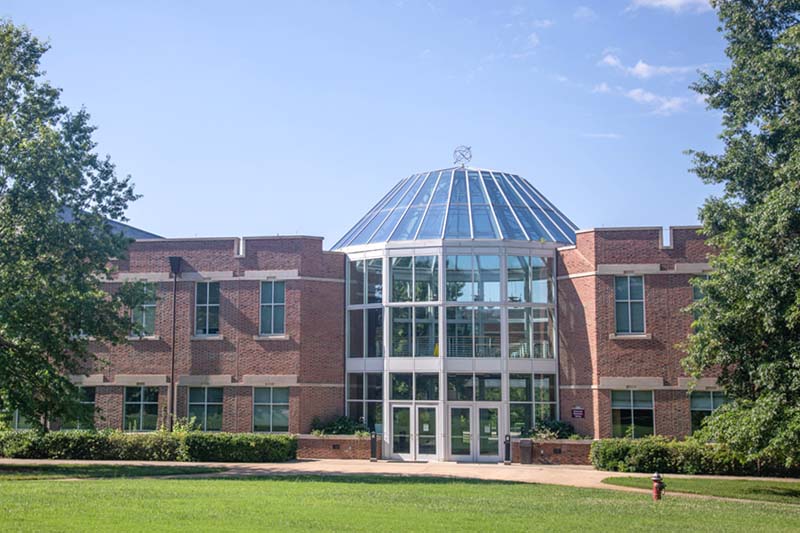Arthur Vining Davis Grant Update
- By Rocio Antelis
- Published

In May 2021, Meredith College received a grant from the Arthur Vining Davis Foundations to support Cultivating Equitable and Inclusive Pedagogical Practices in STEM Higher Education, a three-year project that aims to create fully inclusive and equity-based STEM programs at Meredith.
Over halfway through the project, researchers have compiled preliminary findings on the impact of inclusive instruction in STEM courses at Meredith. After the implementation of inclusive pedagogical methods in the fall of 2022, both faculty members and students reported an inclusive, positive classroom environment.
Initial Needs Assessment
For over 15 years, higher education institutions including Meredith have focused on attracting and retaining historically underrepresented students in STEM majors. Despite an increased number of underrepresented students enrolling in STEM majors, there remains a significant gap in the number of these students who complete degrees in STEM, indicating a lack of success in truly addressing the underlying issues. New research suggests that STEM instructor teaching methods have the largest effect on both students switching to a non-STEM major (96%) and persisting in a STEM major (72%).
Inclusive instruction requires faculty to integrate the experiences and perspectives of students into their classrooms and be responsive to diverse student demographics and backgrounds, such as race and ethnicity, gender, social class, academic preparation, learning challenges, age, and family educational attainment.
“As faculty members, we have noticed that our student learning experiences change over time. What worked on students five or ten years ago doesn’t work on current students,” Associate Professor of Chemistry Sasha Ormond saidabout the importance of implementing new, inclusive pedagogy methods in the classroom.
To kick off the project, researchers conducted a needs assessment of the inclusiveness of current STEM instruction at Meredith. The results identified areas of improvement in STEM courses, such as
The project team then worked with several organizations, including Academic Impressions and SEA Change to design a workshop for faculty addressing the issues identified in the needs assessment.
First Cohort of Inclusive Pedagogy Leaders
Beginning in May 2022, 14 faculty members were selected for the first cohort of Inclusive Pedagogy Leaders in STEM. The cohort participated in the all-day workshop on inclusive pedagogical practices led by Rita Kumar from the University of Cincinnati, as well as completed two online courses on the subject matter. Post-workshop, faculty members reported an increase in their knowledge of inclusive instruction and in their motivation and confidence to implement the new strategies.
During the summer, the cohort worked collaboratively to revise course materials and teaching methods to be more inclusive for selected courses offered in the fall of 2022. Throughout the academic year, faculty had the opportunity to discuss challenges and potential solutions during monthly STEM café events.
Pedological methods that were introduced included exam retakes, student exposure to historical or current scientists of various races and sexual orientations, extra credit assignments that connect students’ diversity and course material, and more.
Fall 2022 Outcomes
At the end of the fall 2022 semester, the first cohort and students in the revised courses were surveyed to assess the effect of inclusive instruction. In comparison with their post-workshop levels, faculty reported
Students and faculty both reported an inclusive classroom environment with aspects such as
When asked about their feelings of belonging at Meredith College and within STEM, 82% of students responded generally positively.
The results suggest faculty were well-positioned to create inclusive environments and that students perceived the classroom environments to be inclusive. Additionally, faculty members and students identified areas of improvement such as faculty-assigned groups (as opposed to students choosing their groups) and including more diversity in course materials.
Second Cohort
In May 2023, a second cohort of 11 faculty members was selected to continue implementing inclusive practices for the 2023-24 academic year. Seven of the first cohort members chose to participate in the second year.
The second cohort attended a two-day workshop which began with a self-guided online training by educational consultant Barbi Honeycutt, followed by a Q&A session. The second day of the workshop was an all-day event led by Bryan Dewsbury, principal investigator of the Science Education and Society Research Program at Florida International University. Similar to the first cohort, faculty members reported a significant improvement in their knowledge and confidence to implement inclusive instructional practices.
“One reason why DEI is so important to me is that my son has Down syndrome. I want for him to feel like he belongs and show others that different is just that — different. It should be valued because that is how we learn and become better,” said Ormond about why she participated in the project. “It was useful to be able to brainstorm ideas with other faculty and experts.”
At the end of the academic year, cohort members and students will once again be surveyed to assess the impact of inclusive instruction. Final findings are expected to be available in August 2024 after the survey data has been analyzed.
News Director
316 Johnson Hall
(919) 760-8087
Fax: (919) 760-8330
PRINCETON REVIEW
U.S. NEWS
NICHE
3800 Hillsborough Street Raleigh, NC 27607-5298 | (919) 760-8600 Fax: (919) 760-8330 | © 2024 All Rights Reserved.